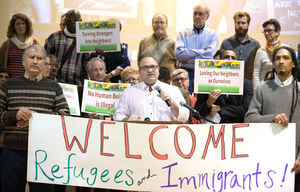
I love Thanksgiving, yet I cheer for the lucky turkey that gets the presidential pardon because I am on the side of turkeys. I know that it is hard to make a case for them. I admit that turkeys are unattractive creatures with huge bodies and tiny heads with folds of drooping skin around their chins. They keep puffing their feathers pretending to be peacocks, emitting dreadful sounds that provoke their tribe to respond in a loud disorganized chorus.
I recognize that my support for the turkeys’ right to live could disqualify me as a Thanksgiving enthusiast. Moreover, not only do I side with turkeys, I am also an anthropologist with an interest in the origin of myths. As with all myths, research of historic documents indicates some issues with the facts in the Thanksgiving myth. The Pilgrims didn’t really have the kind of Thanksgiving that we recount in our schools; one of the early Pilgrims’ official Thanksgivings to God was rejoicing their massacre of the Pequot Indians in Mystic Connecticut.
To bring up this tragedy would seem to question my love for Thanksgiving. I therefore enlist another fact, it was President Lincoln (not the Pilgrims) who instituted this day of gratitude in 1863 as an annual holiday to be celebrated on the last Thursday of the November. (It changed to the fourth Thursday of November by President Franklin D. Roosevelt in 1939).
Lincoln declared a day of Thanksgiving for a nation torn and divided by the Civil War. Lincoln had the gift of empathy, he understood the enormous suffering that war and slavery had inflicted and knew that in the end people on both sides of the war would need healing and reconciliation. The words he used for declaring Thanksgiving were intended to create community and restore relations across religions, race, sufferings, contentions and recriminations. Thanksgiving in Lincoln’ version meant to create, “Peace, tranquility and union.”
Lincoln’s message while rooted in the conditions of his time had an enduring legacy that will infuse our holiday in the midst of current turmoil. So while I continue to be supportive of turkeys, I am happy to partake in celebrations with friends and family whose sense of identity as Americans is bound in what has become traditional food.

Waves of immigrants that hoped and desired to belong have embraced it, and at the same time incorporated their own foods to make Thanksgiving their America. I hope the turkeys don’t read my praise of Thanksgiving as betrayal. I want them to know that I eat only the non-turkey food, roasted vegetables, mashed potatoes, and the great desserts.

Lincoln legacy encourages us in every generation to re-infuse Thanksgiving with community building acts of empathy and compassion.I would like to include in my Thanksgiving an act of gratitude that in Jewish tradition is offered at the beginning of the Passover Seder, “Let anyone who is hungry enter and eat; let anyone who is needy enter and join us.”